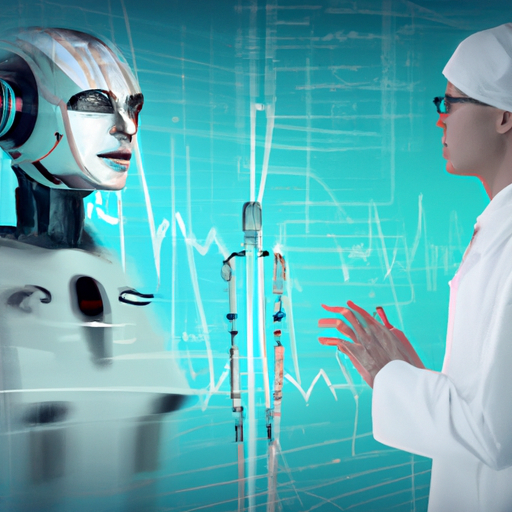
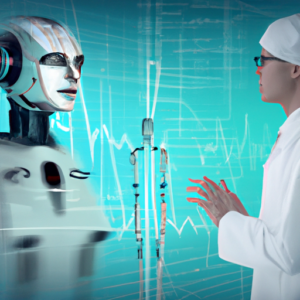
In recent years, artificial intelligence (AI) has emerged as a revolutionary force in various industries, and the medical field is no exception. AI has the potential to transform medical care by enhancing diagnostics, improving treatment plans, and enabling personalized healthcare. This article explores the current applications of AI in the medical industry, highlighting examples where AI has already played a significant role. Furthermore, it delves into the future possibilities of AI in medicine, discussing promising technologies and techniques that will benefit each individual human being. From AI-driven advancements in cancer detection to drug development, the integration of AI in the medical field is opening up new avenues for improving healthcare outcomes. Let us dive deeper into the world of AI revolutionizing medical care and explore the transformative potential it holds for the future.
1. “AI Revolutionizing Medical Care: Current Applications and Future Possibilities”
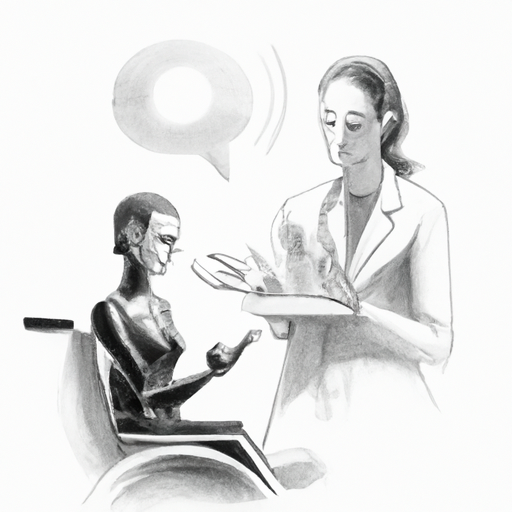
Artificial intelligence (AI) has emerged as a revolutionary technology that has the potential to transform the medical field in numerous ways. It has already started making significant strides in improving medical care, and holds immense promise for the future. Let’s explore some current applications of AI in the medical industry and discuss the possibilities it holds for further advancements.
One area where AI is already making a substantial impact is medical research. AI algorithms have the ability to analyze vast amounts of medical data and identify patterns that may not be apparent to human researchers. This can help in accelerating the discovery of new drugs and treatment options for various diseases. For instance, AI-powered algorithms have been used to analyze genetic data and identify potential targets for cancer therapies, leading to more personalized and effective treatment options for patients. AI is also being utilized in drug development, where it can predict the efficacy and side effects of new drugs, reducing the time and cost associated with traditional methods.
Another significant application of AI in the medical field is in cancer detection. AI algorithms have shown impressive accuracy in analyzing medical images such as X-rays, CT scans, and MRIs, assisting radiologists in detecting cancer at an early stage. This can lead to timely interventions and improved patient outcomes. For example, AI-based software has been developed to detect breast cancer from mammograms with high accuracy, potentially reducing false negatives and improving the overall efficiency of breast cancer screening programs.
Furthermore, AI has the potential to benefit individual patients by enabling personalized medicine. By analyzing a patient’s medical history, genetic information, and lifestyle factors, AI algorithms can provide tailored treatment plans and recommendations. For instance, AI can help in predicting the risk of developing certain diseases, allowing healthcare providers to take preventive measures and devise personalized interventions. AI-powered wearable devices can continuously monitor vital signs and alert individuals and healthcare professionals of any abnormalities, facilitating early intervention and proactive healthcare management.
Looking ahead, there are endless possibilities for AI in the medical field. One area of focus is the development of AI-powered virtual assistants that can interact with patients and provide healthcare guidance. These virtual assistants can answer medical queries, provide personalized health advice, and even offer emotional support, enhancing patient engagement and satisfaction. Additionally, AI has the potential to improve the efficiency of healthcare systems by automating administrative tasks, optimizing resource allocation, and streamlining patient care workflows.
In conclusion, AI is already revolutionizing medical care by enhancing medical research, improving cancer detection, and enabling personalized medicine. With continued advancements in AI technologies and techniques, the medical field is poised to benefit immensely. AI holds immense potential to improve individual patient outcomes, enhance healthcare delivery
2. “Enhancing Healthcare with AI: Examples of AI-driven Advancements in the Medical Industry”
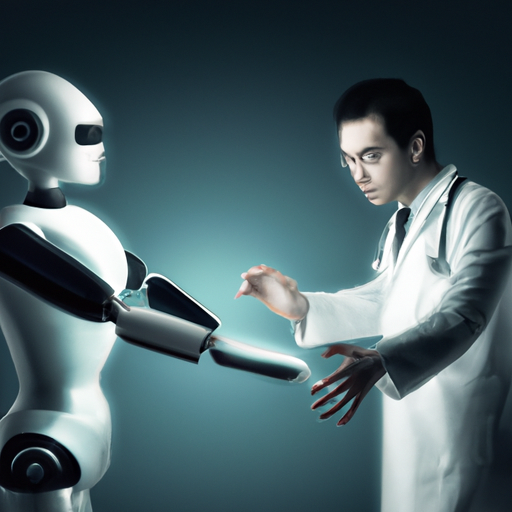
Artificial Intelligence (AI) has made significant contributions to the medical industry, revolutionizing various aspects of healthcare. From diagnosis and treatment to drug development and research, AI has the potential to transform the way we approach medical practices. Let’s explore some specific examples of AI-driven advancements in the medical field:
1. AI-assisted Diagnosis: AI algorithms can analyze vast amounts of medical data, including patient records, lab results, and imaging scans, to assist healthcare professionals in making accurate diagnoses. For instance, AI-powered systems have shown remarkable accuracy in detecting various diseases, such as cancer. By analyzing medical images, AI algorithms can identify subtle patterns and anomalies that may be missed by human eyes, enabling early detection and improved patient outcomes.
2. AI-guided Treatment Planning: AI can assist healthcare professionals in developing personalized treatment plans by analyzing patient data and providing evidence-based recommendations. For instance, AI algorithms can analyze genetic information and medical history to predict a patient’s response to different medications, enabling the selection of the most effective treatment option. This personalized approach improves patient care and reduces the risk of adverse reactions.
3. AI-enabled Robotic Surgery: Robotic surgery, powered by AI, combines the precision of machines with the expertise of surgeons. AI algorithms can analyze real-time data from surgical instruments and provide valuable insights to surgeons during complex procedures, enhancing their decision-making process. Additionally, AI-powered robots can perform minimally invasive surgeries with greater accuracy, reducing the risk of complications and improving patient recovery times.
4. AI-driven Drug Development: Developing new drugs is a time-consuming and costly process. AI offers the potential to accelerate this process by analyzing vast amounts of biomedical data and identifying potential drug candidates. Machine learning algorithms can predict the efficacy and safety of new compounds, reducing the need for extensive animal and human trials. This not only saves resources but also enables the discovery of novel treatments for various diseases.
5. AI-powered Virtual Assistants: Virtual assistants, powered by AI, are increasingly being used in healthcare settings to enhance patient care and streamline administrative tasks. These assistants can provide patients with personalized health advice, remind them to take medications, and schedule appointments. Moreover, AI-powered chatbots can assist healthcare professionals by answering common patient queries, reducing their workload and improving overall efficiency.
The future of AI in the medical field holds even more promise. With ongoing advancements in machine learning, natural language processing, and computer vision, AI will continue to evolve and benefit each individual human being. From improving cancer detection rates to accelerating drug development, AI has the potential to enhance healthcare outcomes, reduce costs, and
3. “Transforming Medicine with AI: Promising Technologies and Techniques for Individualized Healthcare”
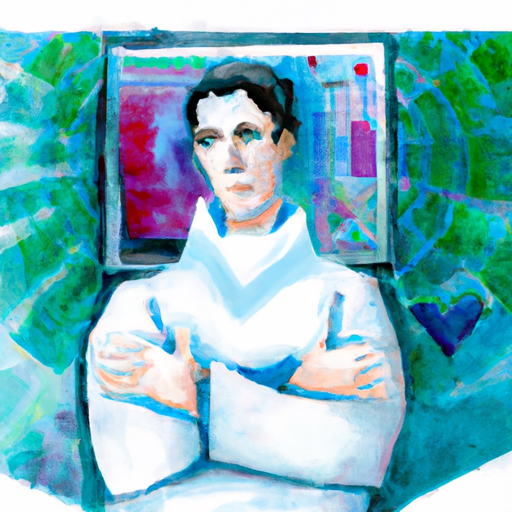
Artificial Intelligence (AI) has emerged as a game-changer in the medical field, revolutionizing the way healthcare is delivered and transforming medicine as we know it. With its ability to analyze vast amounts of data, make accurate predictions, and assist in decision-making, AI is poised to improve patient care, enhance diagnostic accuracy, and streamline medical research. Let us delve into some of the promising technologies and techniques that AI is bringing to the forefront of individualized healthcare.
1. AI-powered Cancer Detection:
AI has already made significant strides in cancer detection, enabling earlier and more accurate diagnosis. Machine learning algorithms can analyze medical images, such as CT scans and mammograms, to identify potential cancerous regions with remarkable precision. By comparing patterns and anomalies in large datasets, AI algorithms can detect subtle signs of cancer that might go unnoticed by human clinicians. This technology not only speeds up the diagnosis but also improves the chances of successful treatment by catching cancer at its early stages.
One notable example of AI in cancer detection is the development of CAD (Computer-Aided Detection) systems. These systems use AI algorithms to highlight suspicious areas in medical images, aiding radiologists in their decision-making process. Additionally, AI-powered pathology techniques can analyze tissue samples and assist pathologists in identifying malignant cells with greater accuracy, reducing the chances of misdiagnosis.
2. AI in Drug Development:
The traditional drug discovery process is time-consuming, expensive, and often characterized by high failure rates. However, AI is transforming this process by accelerating the identification of potential drug candidates and predicting their success rates. AI algorithms can analyze vast amounts of genomic, proteomic, and clinical data to identify patterns and associations that humans might overlook.
For instance, AI can help identify molecular targets for drug development by analyzing genetic data and identifying specific genes or proteins associated with diseases. Additionally, AI algorithms can predict the efficacy of potential drug candidates by analyzing their chemical structures and comparing them to known successful drugs. This enables researchers to focus their efforts on the most promising candidates, saving time and resources.
3. Personalized Treatment and Precision Medicine:
AI has the potential to revolutionize treatment plans by tailoring them to individual patients. By analyzing patient data, including medical history, genetic information, and lifestyle factors, AI algorithms can provide personalized treatment recommendations. This approach, known as precision medicine, takes into account the unique characteristics of each patient, including their genetic predispositions, to optimize treatment outcomes.
For example, AI can analyze genomic data to identify genetic variations that might affect a patient’s response to specific medications. By considering this information, clinicians can prescribe
In conclusion, AI has already begun to revolutionize the medical field and has the potential to greatly enhance healthcare in the future. Current applications of AI in the medical industry include AI-driven advancements such as AI medical research, AI cancer detection, and AI drug development. These technologies have already shown promising results in improving patient outcomes and streamlining medical processes.
For instance, AI medical research has enabled scientists to analyze vast amounts of medical data and identify patterns and correlations that were previously difficult to detect. This has led to breakthroughs in disease diagnosis and treatment, as well as the development of personalized medicine.
Similarly, AI-powered cancer detection systems have proven to be highly accurate and efficient, assisting medical professionals in early diagnosis and treatment planning. By analyzing medical images and patient data, AI algorithms can detect subtle abnormalities that may be missed by human eyes, improving survival rates and reducing unnecessary procedures.
Furthermore, AI drug development holds great promise in accelerating the discovery and development of new medications. By simulating drug interactions and predicting their effectiveness, AI algorithms can identify potential candidates for further research, saving time and resources in the drug development process.
Looking ahead, the future possibilities of AI in the medical field are vast. With ongoing advancements in technology and data analysis, AI has the potential to provide individualized healthcare to each patient. By combining patient-specific data, including genetic information, medical history, and lifestyle factors, AI algorithms can generate personalized treatment plans that are tailored to the unique needs of each individual.
Moreover, AI can aid in remote patient monitoring, allowing healthcare providers to track vital signs and detect any changes in real-time. This can enable early interventions and prevent complications, particularly in patients with chronic conditions.
In summary, AI is already making a significant impact on the medical field, and its potential for further advancements is immense. By harnessing the power of AI in medical research, cancer detection, and drug development, we can expect improved patient outcomes, more precise diagnostics, and personalized treatment plans. The future of medicine is undoubtedly intertwined with AI, and it is an exciting time for both healthcare professionals and patients alike.